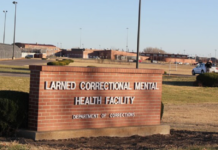
A Johnson County judge on Monday agreed to temporarily block the state’s 24-hour waiting period for abortions as well as a new law passed this year requiring physicians to notify women that their drug-induced abortion can be reversed.
Johnson Count District Judge Christopher Jayaram issued a temporary injunction preventing the state from enforcing broad sections of the Women’s Right to Know law, which was first enacted in 1997 and has been amended six times since.
The order temporarily blocked parts of a law that’s been amended over the years to require physicians to tell women about the “unfounded” risks related to an abortion, including premature birth in future pregnancies and the risk of breast cancer.
It also would halt a law requiring a physician to inform a woman that she has the right to view the ultrasound image of the fetus and listen to the heartbeat.
In a 92-page ruling issued Monday, Jayaram found that parts of the law in question would violate the state constitutional right to bodily autonomy and the abortion providers’ right to free speech under the state constitution as well.
He also questioned the medical accuracy of the information physicians had to provide women, including the information about breast cancer and premature births.
“Because a woman’s right to bodily autonomy – including her right to decide whether to terminate or continue a pregnancy – is fundamental, the court concludes, for purposes of this request for temporary relief, that the State’s rationale and schemes simply do not survive constitutional review,” Jayaram wrote.
“Inevitably, some likely will disagree or take issue with the interim conclusions reached herein on plaintiffs’ motion for a temporary injunction, whether based upon specific moral, ethical, or spiritual concerns,” he wrote.
“However, such considerations are – and must be – separate and apart from this court’s role in evaluating the potential constitutional encroachment – or lack thereof – of the state’s efforts to impose its authority under the auspices of police power, given our state Founding Father’s emphasis on – and the primacy of – the people’s inalienable natural rights.”
Kansans for Life called the ruling a “nightmare.”
“This is a nightmare for women and a dream come true for the profit-driven abortion industry,” said KFL spokesperson Danielle Underwood.
“Women will pay the price for the deceitful practices of the abortion industry that consistently puts its own profits above all else.”
Teresa Woody, who represented the plaintiffs in the case, praised the decision.
“Plaintiffs are very pleased that the district court not only granted a temporary injunction as to the newest act, which required doctors to provide their patients with medically unsound information that a medication abortion can be reversed, but also enjoined other statutory provisions that required doctors to point patients to other erroneous information,” Woody said in an email.
“This ruling restores the doctor patient relationship around the area of reproductive rights and informed consent, and prevents the state from needlessly intruding into that relationship,” Woody said.
Kansas Family Voice expressed dismay over the ruling, however.
“While the judge foreshadowed his opinion during the arguments in this case, this opinion wiping out informed consent for women, is shocking,” said Brittany Jones, director of policy and engagement.
“The majority of this law has been in place for decades, giving women basic information about abortion. Why now did the courts and the abortion industry decide that it violates multiple sections of the Kansas Constitution?”
The Legislature passed the abortion reversal bill this year over the veto of Democratic Gov. Laura Kelly, who said the scientific value behind the legislation was dubious.
The judge’s ruling on Monday came about three years after the Kansas Supreme Court found in 2019 that abortion was a protected right under the state constitution.
The court is now reviewing a request from Attorney General Kris Kobach to reconsider the ruling from 2019. Kobach’s office didn’t immediately respond to the ruling Monday.
Last year, Kansas voters overwhelmingly rejected a constitutional amendment that would have removed the right to an abortion from the state constitution.
At that time, abortion rights opponents warned that there would be an effort to roll back limits placed on the procedure over the years.
In June, abortion providers went to court challenging a law enacted this year that required physicians to notify women that their drug-induced abortion could be reversed.
However, the lawsuit went deeper, asking Jayaram to throw out the state’s entire informed-consent law known as the Women’s Right to Know Act.
Jayaram said the abortion providers that the brought the lawsuit presented credible evidence that the information given to women was not accurate.
He said the state’s witnesses who presented evidence in the case contorted their testimony to justify what appeared to be misleading and inaccurate pronouncements on the ramifications of an abortion — “all to promote the state’s clear preference in favor of childbirth, rather than abortion.”
“To require disclosures that are inaccurate and misleading, in an effort to delay or prevent a pregnant woman from exercising her right to terminate her pregnancy seems unlikely narrowly tailored to improve maternal health or safety,” he wrote.
Jayaram, meanwhile, said the abortion providers offered “credible evidence” that many – potentially 30% to 40% – of the disclosures required by the law were medically inaccurate and inconsistent with the science of embryonic and/or fetal development.
For example, Jayaram said there was “no credible evidence” that abortion increases the risk of breast cancer, and “the overwhelming weight of authority demonstrates that this is unlikely to be true or accurate.””
“The National Cancer Institute and the National Academies of Sciences, Engineering, and Medicine have actively reviewed these issues, and their current position is that abortion does not increase such risks,” he wrote.
“Other major medical organizations concur with these conclusions, which are the current mainstream medical consensus.”
He expressed concern about the abortion reversal procedure as well.
The procedure is based on the controversial idea that a medical abortion can be stopped halfway through a two-drug regimen.
The legislation emerged at a time when drug-induced abortions have been rising.
There were 7,339 abortions induced with pills during 2022 compared to 5,321 the previous year. In 2010, there were just 2,202 medical abortions.
The protocol for a medical abortion employs two steps: first with the drug mifepristone and a second with the drug misoprostol.
The first drug blocks a hormone critical for starting the pregnancy.
The second drug, administered to 24 to 48 hours later, flushes the uterus by causing cramping and bleeding similar to a miscarriage.
Abortion rights opponents have cited research showing that when the hormone progesterone was introduced between the first and second pill, four of six women studied brought their pregnancy to term.
However, Jayaram wasn’t persuaded.
“There is no credible scientific/medical evidence that the ‘reversal’ therapy proposed in the amendment actually ‘reverses’ the effects of mifepristone,” the judge wrote.
“Indeed, the overwhelming weight of credible evidence, given this record, suggests that such a theory is misleading, untested, potentially-dangerous for women, and speculative.”
The state’s “testimony and explanation of the ‘reversal’ therapy and the limited case studies proffered, to the extent that they claim ‘reversal’ therapy is tested, safe, and therapeutic, are not credible or grounded in established and appropriately peer-reviewed and validated science.” he wrote.
Jayaram said the abortion providers indicated that they would likely cease providing medication abortions to patients in Kansas if they had to comply with the reversal law because they believe it creates ethical and legal dilemmas for them.
The plaintiffs said the law required physicians to give women information that was “medically irrelevant, inaccurate (in parts), and potentially detrimental.”
The judge said the only randomized controlled study of the effect of progesterone after patients begin a medication abortion was halted by the researchers due to several patients manifesting serious adverse impacts from the study protocol.
Alexis McGill Johnson, president and CEO of Planned Parenthood Federation of America, called the decision a “rebuke of misinformation.”
“Kansans made it clear last year that they support access to abortion, which includes the freedom to receive timely care without being subjected to state-mandated inaccurate information from their medical provider,” Johnson said.
“Today’s ruling allows providers to give their patients the quality care they deserve, reduces the stigma and misinformation around abortion, and does away with arbitrary restrictions that only serve to control people,” she said.
House Speaker Dan Hawkins, in a joint a statement with Majority Leader Chris Croft and Speaker Pro Tem Blake Carpenter, lamented the decision.
“Informed consent is an integral part of any doctor-patient relationship and abortion is no exception,” they said.
“Sadly, this court decision temporarily erases common sense protections for the mother,” they said.
“We are discouraged by this court’s ruling, but will continue to stand strong for a woman’s right to medical information as this case continues through the court system.”















